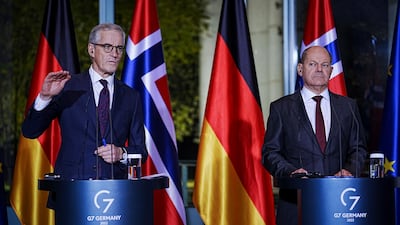Germany and Norway have asked Nato to lead an alliance to protect critical underwater infrastructure, their leaders said on Wednesday, weeks after explosions hit two key gas pipelines in the fallout from the war in Ukraine.
"We are in the process of asking the Nato Secretary General [Jens Stoltenberg] to set up a co-ordination office for the protection of underwater infrastructure," German Chancellor Olaf Scholz said in Berlin.
"We take the protection of our critical infrastructure very seriously and nobody should believe that attacks will remain without consequences."
Norwegian Prime Minister Jonas Gahr Store said the alliance would be "an informal initiative to exchange between civilian and also military actors", with Nato providing "a centre, a co-ordination point".
Underwater cables and pipelines were "arteries of the modern economy" and it was necessary to create "a co-ordinated joint effort to ensure security for this infrastructure", Mr Store said.
Mr Stoltenberg, who is in Berlin for a security conference, welcomed the joint proposal later on Wednesday.
A look at the Nato military alliance - in pictures
"Nato has been working for many years to secure our undersea infrastructure," Mr Stoltenberg said.
"We have stepped up our efforts after the recent sabotage of the Nord Stream pipelines, and it is vital to do even more to ensure that our offshore infrastructure remains safe from future destructive acts."
The pipelines, which connect Russia to Germany, had been at the centre of tension as Moscow cut gas supplies to Europe in retaliation to western sanctions over the invasion of Ukraine.
New underwater footage shows Nord Stream pipeline damage - video
Although they were not in operation when the leaks occurred, they both still contained gas that bubbled up through the water and into the atmosphere.
Russia and western countries, particularly the US, have traded bitter barbs over who was responsible for the blasts.
Several European countries have since taken steps to increase security around critical infrastructure.
The G7 interior ministers warned in November at a meeting in Germany that the Nord Stream explosions had highlighted "the need to better protect our critical infrastructure".











